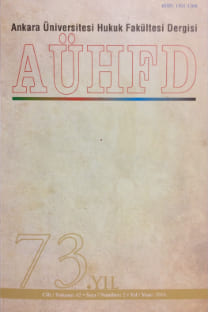MUTLAK MONARŞİYE LAİK SAVUNMA: TEVRATIN CANAVARI LEVİATHAN
Secular Defense for Absolutism: Torahs Monster Leviathan
___
- AĞAOĞULLARI, Mehmet Ali - AKAL, Cemal Bâli - KÖKER, Levent: Kral Devlet ya da Ölümlü Tanrı, Đmge Kitabevi, Ankara, 1994. AKAL, Cemal Bâli: Đktidarın Üç Yüzü, 6. Baskı, Dost Kitabevi, Ankara, 2013. AUBREY, John: Brief Lives, Edited By Andrew CLARK, Clarendon Press, Oxford, 1898. BARCLAY, William: The Lords Supper, Westminster John Knox Press, London, 2001. BODIN, Jean: Six Books of the Commonwealth, Abridged and Translated by M.J. TOOLEY, Blackwell, Oxford, 1967. BOYER, Carl B.-MERZBACH, Uta C.: A History of Mathematics, Third Edition, Foreword by Isaac Asimov, John Wiley&Sons Inc., New Jersey, 2011. CAJORI, Florian: A History of Mathematics, Chelsea Publishing Company, 5th Edition, New York, 1991. CURLEY, Edwin: Introduction, Thomas Hobbes, Leviathan, With Selected Variants From the Latin Edition of 1668, Edit With Introduction and Notes by Edwin CURLEY, içinde (VIII-XLVII), Hackett Publishing Company, Indianapolis, 1994. GASKIN, J.C.A.: Introduction, Thomas HOBBES, The Elements of Law, (Human Nature and De Corpore Politico), Edited with and Introduction and Notes by J.C.A. GASKĐN, içinde (XI-XLII), Oxford University Press, 2008. GERT, Bernard: Introduction, Thomas HOBBES, Man and Citizen(De Homine and De Cive), Edited with an Introduction by Bernard GERT, içinde (3-32), Hackett Publishing Company Inc., Indianapolis, 1991. HIRST, Derek: England in Conflict, 1603-1660, Kindom,Community, Commonwealth, Bloomsbury Academic, London, 1999. HOBBES, Thomas: Behemoth or Long Parliament, Edited by Ferdinant Tönnies, with an Introduction by Stephen Holmes, University of Chicago Press, Chicago, 1990. HOBBES, Thomas: De Cive(The Citizen), Man and Citizen (De Homine and De Cive), Edited by Bernard GERT, içinde (87-388), Hackett Publishing Company, Indianapolis, 1991. HOBBES, Thomas: De Corpore Politico, The Elements of Law (Human Nature and De Corpore Politico), Edit with an Introduction and Notes by J.C.A. GASKIN, içinde (183-228), Oxford University Press, Oxford, 2008. HOBBES, Thomas: De Homine(On Man), Man and Citizen (De Homine and De Cive), Edited by Bernard GERT, içinde (33-85), Hackett Publishing Company, Indianapolis, 1991. HOBBES, Thomas: Human Nature, The Elements of Law (Human Nature and De Corpore Politico), Edit with an Introduction and Notes by J.C.A. GASKIN, içinde (21-108), Oxford University Press, Oxford, 2008. HOBBES, Thomas: Leviathan, Çeviren Semih LĐM, Yedinci Baskı, Yapı Kredi Yayınları, Đstanbul, 2008. HOBBES, Thomas: Leviathan, Edited with an Introduction and Notes by J.C.A. GASKIN, Oxford University Press, Oxford, 2008. HOBBES, Thomas: Six Lessons to the Professors of the Mathematics, The English Works of Thomas Hobbes of Malmesbury, Edited by William MOLESWORTH, Volume:VII, içinde (181-356), Longman, Brown, Green and Longmans, London, 1845. HOBBES, Thomas: The Verse Life Thomas Hobbes, The Elements of Law (Human Nature and De Corpore Politico), Edit with an Introduction and Notes by J.C.A. GASKIN, içinde (254-264), Oxford University Press, Oxford, 2008. KING, Preston: The Ideology of Order, A Comparative Analysis of Jean Bodin and Thomas Hobbes, Frank Cass, London, 1999. MACHĐAVELLĐ, Niccoló: Hükümdar, Çeviren: Sebahatin BAĞDATLI, Der Yayınları, Đstanbul, 1999. MARTINICH, A.P.: Hobbes: A Biography, Cambridge University Press, Cambridge, 1999. MINTZ, Samuel l.: The Hunting of Leviathan, Cambridge University Press, Cambridge, 1969. MORRILL, John: The Causes and Course of the British Civil Wars, The Cambridge Companion to Writing of the English Revolution, Edited by N. H. KEEBLE, içinde (13-31), Cambridge University Press, Cambridge, 2001. ROGOW, Arnold A.: Thomas Hobbes(Radigal in the Service of Reaction), W.W. Norton, New York, 1986. SKINNER, Quentin: Reason and Rhetoric in the Philosophy of Hobbes, Cambridge University Press, Cambridge, 1997. JOHNSTON, David: The Rhetoric of Leviathan, Princeton University Press, Princeton, 1989. SMITH, Thomas: Euclid, His Life and System, Charles Scribners Sons, New York, 1902. SOMMERVILLE, Johann P.: Thomas Hobbes: Political Ideas in Historical Context, Palgrave Macmillan, Basingstoke, 1992, s.119-127. STEINBERG,Jules: The Obsession of Thomas Hobbes:The English War in Hobbes Political Philosoph, Peter Lang Pub Inc., New York, 1988. TUCK, Richard:Hobbes: A Very Short Introduction, Oxford University Press, Oxford, 1989. WILLIAMS, Howard: Kants Critique of Hobbes(Sovereignty and Cosmopolitanism), University of Wales Press, Cardiff, 2003. Makaleler BIRD, Alexander: Squaring the Circle:Hobbes on Philosophy and Geometry, Journal of the History of Ideas, Volume:57, No:2, 1996, s. 217-231 CARTER, Alan: The Method in Hobbes Madness, Hobbes Studies, Vol:XII, 1999, s. 72-89. DAWSON, Doyne: The Origins of War: Biological and Anthropological Theories, History and Theory, Volume:35, No:1, 1996, s.1-28. GRANT, Hardy: Geometry and Politics: Mathematics in the Thought of Thomas Hobbes, Mathematics Magazine, Volume:63, No:3, 1990, s. 147-154. KOPEL, David B.: The Catholic Second Amendment, Hamline Law Review, Volume:29, Number:3, 2006, s.519-565. LUND, William R.: Tragedy and Education in the State of Nature:Hobbes on Time and the Will, Journal of the History of Ideas, Volume:48, No:3, 1987, s. 393-410. MACGILLIVRAY, Royce: Thomas Hobbess History of the Eglish Civil War A Study of Behemoth,Journal of the History of Ideas, Volume:31, No:2, 1970, s.179-198. NAUTA, Lodi: Hobbes on Religion and the Church between the Elements of Law and Leviathan:A Dramatic Change of Direction?, Journal of the History of Idea, Volume:63, Number:4, 2002, s. 577-598. NAUTA, Lodi: Hobbes the Pessimist, British Journal fort he Historyof Philosophy, Volume: 10/, Issue:1, 2002, s.31-54. NEGRETTO, Gabriel L.: Hobbes Leviathan. The Irresistible Power of A Mortal God, Analisi e Diritto Ricerche di Giurisprudenza, 2001, s. 179-191. RANDALL, John Herman: The Development of Scientific Method in the School of Padua, Journal of the History of Ideas, Volume:1, No:2, 1940, s. 177-206. SACKSTEDER, William: Three Diverse Sciences in Hobbes: First Philosophy, Geometry, and Physics, Review of Metaphysics, 45/4, 1992, s.739-772.
- ISSN: 1301-1308
- Yayın Aralığı: 4
- Başlangıç: 1943
- Yayıncı: Ankara Üniversitesi Hukuk Fakültesi
SİYÂSET-İ ADLİYYEDEN MÜHİM BİR MEBHÂS
Yanko VİTİNOS, Konan Belkıs CEV.
KARİNE KAVRAMI, KANUNİ KARİNELER VE VARSAYIMLAR
14 MART 1978 TARİHLİ TEMSİLE UYGULANACAK HUKUK HAKKINDA LA HAYE KONVANSİYONU
MUTLAK MONARŞİYE LAİK SAVUNMA: TEVRATIN CANAVARI LEVİATHAN
SİYÂSET-İ ADLİYYEDEN MÜHİM BİR MEBHÂS (MUHAMÂT 13; Sayfa: 392-402)
TÜRK HUKUKUNDA MiRASIN RESMi TASFiYESi
SİYASET-İ HAKİKİYYE VE SĐYASET-İ HAYÂLİYYE (İstişare, Sayı:16, Yıl:1324, s.728-731)
ACENTENİN DENKLEŞTİRME HAKKI VE ALMAN HUKUKUNDAKİ YENİ GELİŞMELER
6458 SAYILI YABANCILAR VE ULUSLARARASI KORUMA KANUNUNA GÖRE YABANCILARIN VİZE ALMA ZORUNLULUĞU
